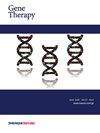临床基因治疗的成功与挑战。
IF 4.6
3区 医学
Q1 BIOCHEMISTRY & MOLECULAR BIOLOGY
引用次数: 0
摘要
尽管在过去的三十年里,该领域跌宕起伏,但基因治疗科学仍在继续进步,并为越来越多的疾病提供持久的治疗。目前有针对不同器官系统的各种遗传性和获得性疾病的积极临床试验。方法包括血液干细胞(HSC)、T淋巴细胞和其他免疫细胞的离体修饰,以及通过局部或全身给药将基因或基因编辑试剂在体内递送到相关靶细胞。在这篇文章中,我们强调了基因治疗在三个高活性领域的成功和持续的挑战:通过靶向造血干细胞的遗传性血细胞疾病,使用嵌合抗原受体基因修饰的免疫效应细胞的恶性疾病,以及眼科、神经科、,以及使用腺相关病毒(AAV)载体的体内给药的凝血障碍。近年来,许多此类疾病都有了真正的治疗方法,其持续的临床效益超过了其他医学方法。这些治疗方法中的每一种都面临着持续的挑战,即一次性成本高,以及按照质量和一致性的药理学标准生产治疗剂(生物病毒和细胞产品)的复杂性。需要新的报销模式,使这些创新的治疗方法广泛提供给有需要的患者。本文章由计算机程序翻译,如有差异,请以英文原文为准。
Successes and challenges in clinical gene therapy
Despite the ups and downs in the field over three decades, the science of gene therapy has continued to advance and provide enduring treatments for increasing number of diseases. There are active clinical trials approaching a variety of inherited and acquired disorders of different organ systems. Approaches include ex vivo modification of hematologic stem cells (HSC), T lymphocytes and other immune cells, as well as in vivo delivery of genes or gene editing reagents to the relevant target cells by either local or systemic administration. In this article, we highlight success and ongoing challenges in three areas of high activity in gene therapy: inherited blood cell diseases by targeting hematopoietic stem cells, malignant disorders using immune effector cells genetically modified with chimeric antigen receptors, and ophthalmologic, neurologic, and coagulation disorders using in vivo administration of adeno-associated virus (AAV) vectors. In recent years, there have been true cures for many of these diseases, with sustained clinical benefit that exceed those from other medical approaches. Each of these treatments faces ongoing challenges, namely their high one-time costs and the complexity of manufacturing the therapeutic agents, which are biological viruses and cell products, at pharmacologic standards of quality and consistency. New models of reimbursement are needed to make these innovative treatments widely available to patients in need.
求助全文
通过发布文献求助,成功后即可免费获取论文全文。
去求助
来源期刊

Gene Therapy
医学-生化与分子生物学
CiteScore
9.70
自引率
2.00%
发文量
67
审稿时长
4-8 weeks
期刊介绍:
Gene Therapy covers both the research and clinical applications of novel therapeutic techniques based on a genetic component. Over the last few decades, significant advances in technologies ranging from identifying novel genetic targets that cause disease through to clinical studies, which show therapeutic benefit, have elevated this multidisciplinary field to the forefront of modern medicine.
 求助内容:
求助内容: 应助结果提醒方式:
应助结果提醒方式:


